- Home
- Scott Westerfeld
Touching Darkness m-2 Page 2
Touching Darkness m-2 Read online
Page 2
“What?” She looked at her window. She’d left it open, protected only by a gauzy curtain. “I don’t want to go back in there with him… watching.”
“You have to, Jess. Midnight’s over soon. You don’t want to get caught out here. You’d be grounded forever.”
“I know, but…” She looked at the man. There were worse things than being grounded.
“I’ll stay right here,” Jonathan said. “I’ll hide and wait until midnight ends and make sure he doesn’t do anything.”
Jessica’s feet were rooted to the spot, normal gravity heavy on her.
“Go on, Jess. I’ll be watching him.”
There was no use arguing. The midnight moon was setting, and she didn’t want to sneak back in the window during normal time. Once the man unfroze, she was probably safer inside than out. She touched Jonathan’s arm. “Okay. But be careful.”
“Everything’s going to be fine, I promise. I’ll call you tomorrow morning.” He kissed her hard and long this time, giving her one last taste of featherlightness. Then Jessica crossed the street and crawled in through her window.
The obsessively neat room seemed cold now, unwelcoming in the blue light. Jess ran her fingers along the bottom of the windowsill, feeling the thirteen thumbtacks. In a few minutes they would be useless. Number magic couldn’t protect her from the man outside. Soon even Demonstration would be just a flashlight.
She shut the sash and locked it, then moved around the room, securing the other windows.
A glance at her watch confirmed that she didn’t have time to check the locks in the whole house, not without waking up her parents or Beth. But she had to do something. She went to the neatly organized drawer of scissors, tape, and computer disks, found a rubber stop, and wedged it beneath her bedroom door. At least if anyone tried to come into her room, they’d make a lot of noise.
Still, Jessica knew she wasn’t going to get much sleep tonight.
Sitting on the floor, her back against the door, she waited, clutching Demonstration in her hands. It might not do its flamethrower thing in normal time, but with its heavy steel shaft, it was better than nothing.
Jessica closed her eyes, waiting for the safety of the blue time to end.
The jolt came again—softer, as always when the suspended moment of midnight finished. The floor trembled beneath her, the world shuddering as it started up again.
A noise reached her ears and her eyes jerked open, her knuckles white against the flashlight. Color had flooded back into the room. There were hard shadows and bright, sharp details everywhere. Jessica squinted through the suddenly harsh light, eyes darting from window to window.
Then she saw what had made the noise and let out a sigh of relief. The quarter sat on her floor where it had finally fallen, bright against the dark wood.
Jessica crawled over and peered down at it.
“Tails,” she muttered.
2
12:01 a.m.
FLATLAND
Normal time came down on Jonathan like a lead blanket.
He lay flat on the roof, just above the man with the camera. Jonathan’s arms and legs were spread to gather more of the shingles’ friction, but as gravity returned, he slid for a dizzying second down the tilt of the roof. A scraping noise escaped from under him, and he cursed silently.
Then Jonathan heard the whir of the camera below, a string of insistent whispers that jumped to life as normal time began. The man had been taking multiple exposures, across the exact moment of midnight. That was bad news. But at least the camera’s whine had drowned out the sound of his slide.
Jonathan lifted his head painfully. It was hard even to breathe, squashed onto the cold expanse of slate by the suddenly crushing gravity. Below, the man lowered his camera and checked the time on his expensive watch, which glittered in the moonlight. He started to break down the long telephoto lens.
A shiver passed through Jonathan. The slate roof was cold now that midnight had fled, and the chill Oklahoma wind went straight through him. He’d expected to be home before the blue hour ended, so he hadn’t even brought a jacket.
Damn, he thought, imagining the long walk home. Moving silently, he drew his limbs closer to his body and blew into his hands.
Below, the man had gotten his camera into its case. Drawing his coat tighter, he crossed the backyard of the house in a low crouch and gracefully pulled himself over the wooden fence. The sound of footsteps faded down the alley.
Jonathan edged himself to the gutter and looked down, wishing he hadn’t picked the roof as his hiding place. A minute ago it had seemed the natural thing to do—natural when you could fly, anyway.
But here in Flatand, it was a nasty drop.
He lowered himself down, his fingertips clinging to the gutter, which creaked loudly. Then he fell like a sack of potatoes to the ground.
“Ow!” A sharp pain shot through his right ankle, but Jonathan bit the sound off, hoping it had been covered by the moan of the wind through the trees. The agony squeezed its way into his eyes, hot tears forcing their way out. He took a deep breath, ignoring the pain. The man had already gotten too far ahead.
Jonathan limped across the lawn and pulled himself up the fence to peer over. He could see a figure at the end of the alley, walking away fast in the cold. Jonathan hauled himself over, his muscles straining. It always took a while to adjust to normal gravity, mentally as well as physically. Midnight only lasted for an hour every day, but it was the only time Jonathan felt complete. For the other twenty-four hours he was trapped in Flatland, stuck to the ground like an insect in honey.
Dropping onto the hard-packed dirt on the other side of the fence sent another lash of pain through his ankle. He bit his lip again to keep silent, crouching in the shadows by the fence until the man turned a corner up ahead.
Jonathan limped after him.
A few moments later the sound of a car starting rumbled down the alley. Jonathan scuttled into a back driveway, barely escaping the headlights. In his mind he saw an easy jump that would put him just over the roof above and out of sight, but in Flatland it was all Jonathan could do to scramble into the shadows behind a parked pickup truck.
The car passed slowly in the unpaved alley, grumbling over loose rocks and gravel. Its headlights were blinding. Jonathan’s eyes hadn’t adjusted from the blue hour any more than the rest of him had. He tasted blood in his mouth, where a throb of pain beat in time with his frantic heartbeat. Great. At some point he’d opened up his lip.
After the car passed, Jonathan limped out from his hiding place and crouched in the red glare of its taillights so that he could read the license plate. Ducking back in the shadows, he repeated it to himself again and again, like some magic spell of Dess’s.
The sound faded, and Jonathan allowed himself a sigh of relief. At least the man had gone. For the moment, he had only been spying.
But why? As far as Jonathan knew, no one who wasn’t a midnighter knew about the secret hour. Silence had always been the unspoken pact among the five who had experienced the blue time.
But this man had to know something. What were the chances that this was just a coincidence? Did he pose a threat?
Jonathan headed down the alley, favoring his good foot. He’d have plenty of time to think about all this on the way home, in between trying not to freeze to death and looking out for Clancy St. Claire. The sheriff really had it in for Jonathan since busting him and Jessica for breaking curfew. And it was a Saturday night, Jonathan realized, not the best time to run afoul of St. Claire. He didn’t care to spend two nights in jail, bouncing off the walls in the secret hour and waiting for Monday morning to come.
He limped to the end of the alley and peered out carefully, then took a few steps into the street. No car, nothing.
He glanced back at Jessica’s house down the road. Her light was still on. She was probably scared to death, watching her windows and wondering what lurked outside.
Jonathan shivered, thinking about skip
ping the cold walk home. On the weekend his dad would hardly notice, and Jessica’s floor would be a lot warmer than some ditch. He could leave early in the morning, before anyone else in the house stirred.
Jessica had asked him to come home with her, he remembered. She’d wanted to show him something. Or maybe she’d just wanted to be with him somewhere safe and private. They’d hardly kissed each other at all tonight.
“Crap,” he said softly, wishing he’d thought of this before sending Jessica home. She probably would have said yes.
She’d probably be glad to see him at her window.
After a long, cold minute Jonathan sighed and let go of the frustrating thoughts. This wasn’t the secret hour anymore. This was Flatland. Even one tap on the window risked their getting caught, and Jessica would be blamed. Her parents would freak if they found him there. Jonathan was pretty certain that the cops had mentioned his name to them when they’d taken Jessica home. He doubted he’d be welcome at any time of day, much less in the middle of the night.
He turned and took the first few painful steps away. When he could fly, the trip home from Jessica’s took less than five minutes, but in normal gravity (and with a sprained ankle, he was pretty sure) it was going to take at least two hours.
He huddled in his thin shirt, checked the darkened road ahead for police cars, and headed home.
3
1:19 a.m.
GEOSTATIONARY
The dream came again, full of glowing wire frames, lines of fire forming spheres, like the doubled eights of a baseball’s stitching or the twirl of peel left after an orange is stripped in one long spiral. The lines twisted around each other, bright snakes twining on a beach ball, performing new tricks every night. They examined their combinations restlessly, searching for one pattern out of many…
Dess woke up sweating, even though her room was cold.
She rubbed her eyes with bitten-down thumbnails and looked at her clock. Damn. It was after midnight; she’d slept through the secret hour again.
Dess shook her head. This never used to happen. Even on those rare occasions when she did go to bed before midnight, the passage into the blue time always awakened her with its shudders and sudden silence. What was the point of having a whole secret hour if you slept through it?
But somehow she’d missed it again.
The fiery shapes of the dream still pulsed through Dess’s mind, her latest project troubling her brain again, demanding answers that didn’t exist yet in the scraps of data she’d managed to gather. The dream came every night now, her mind a renegade calculating engine clattering in the darkness. But she had come to understand what some of the images meant.
The spheres were the earth, this lovely ball of fun that humanity was stuck to, except for Jonathan in the secret hour, lucky prick. The glowing lines were coordinates—longitude and latitude and whatever other invisible geometries made Bixby important. (Now there were two words that should never go together: Bixby and important. Whoever had decided that this town should be the center of the blue time needed to watch the Travel Channel more.)
Dess frowned. Tonight’s dream had conjured up a new image in her head: a circle of bright diamonds evenly spaced around one of the beach ball earths, orbiting it at a stately pace. There were twenty-four of them, her mind told her—a very darkling number. But what did the image mean?
Sometimes she wondered if this whole project had unhinged her. Maybe she was reading too much into Bixby’s location.
Dess shook her head. Her father’s oil-drilling maps were very accurate, and math never lied. The intersection of 36 north and 96 west sat a few miles outside town, dead on the snake pit. Those two numbers were stuffed full of twelves. That had to mean something; the snake pit was a source of Rex’s lore and a major darkling magnet, squatting in the badlands like a giant spider in the middle of its web.
One thing had become abundantly clear to Dess: the geometry of the blue time was a lot more complicated than any spiderweb. There were asymmetries in the way the secret hour formed itself, subtleties in the way its lines reached across the hard-packed desert and into Bixby. Melissa sometimes complained about how her mindcasting changed depending on where she was, gaining or losing strength like a car radio fading in and out on a drive through the mountains. And now that Dess had bothered to map all of Rex’s precious lore sites, a pattern had emerged there too. And of course, there were the people who disappeared, like Sheriff Michaels two years ago. Darklings never seemed to bother stiffs, but they had to eat something. Rex said there were special places where the barrier between frozen and normal time was shaky. That was the real reason behind Bixby’s famous curfew. If a normal person—or an unlucky cow or rabbit—wound up getting frozen near one of these spots, they could be sucked through the barrier for an unexpected trip down the food chain.
All this meant one thing: midnight had a shape, with ripples and rough spots. Maybe there were places where Dess’s number magic was stronger or weaker, or where Jessica’s flame-bringing would really kick ass, or where the darklings couldn’t come. Maybe there were also places to hide.
Great theory, but the details were the tricky part. This math was hard. It was trig on steroids, and thinking about it wore Dess out all day and then mangled her dreams at night.
She lay there, staring at the notes scribbled on her blackboard, wishing she had some sort of calculating machine to untangle the numbers. Dess frowned again; she’d never used a mere calculator in her life. And the school computer that Mr. Sanchez let her hack around with wouldn’t cut it either. What she really needed for this stuff was a NASA-grade, global-warming-predicting, doomsday-asteroid-tracking supercomputer.
Across the room Ada Lovelace stood on her little platform, staring at Dess, stoic as ever.
“Yeah, I wish you could help me too,” she told the doll. But the real Ada was long dead (for 153 years, in fact), all that talent gone to waste before the world was smart enough to realize how brilliant she was. “I know the feeling, sweetie.”
Dess rolled out of bed.
The big problem was measuring all this stuff. The blue time didn’t come with street signs and trig tables, and you couldn’t Google it for more details. When she pumped Melissa for data, Dess always hid her thoughts, not wanting to reveal her sudden interest in the mindcaster’s reception problems. For some reason, Dess wanted to keep this discovery her own little secret… Well, okay, she knew the reason. Rex and Melissa definitely had their secrets, after all, and Jessica and Jonathan were so far up Couple Mountain, she was considering sending a rescue team. This thing was hers.
But her secrecy didn’t leave Dess much to work with, just midnighter gossip and her dad’s oil-drilling maps. And those she had to borrow in the middle of the night.
“Speaking of which…” It was 1:25 A.M. now, a solid 16,500 seconds before the old grump’s alarm clock went off, if he was working this weekend. The perfect time to do a little map math.
Dess swung her bare feet to the floor, feeling the wind pushing up between the ancient boards. She tested her weight against the wood—some nights were creakier than others. Her bedroom door opened silently thanks to her weekly treatments of WD-40. (Sometimes it was useful having a dad who’d wanted a son.)
The wind was fierce tonight, a low, insistent moan marked by the beat of a loose shutter somewhere in the trailer park across the field in back. Thankfully, there were enough random creakings throughout the house to cover any noise she might make.
In the middle of the Living room was a big flat file, the metal top marked with rust circles the exact circumference of a Pabst Blue Ribbon bottle. Among the empties and bottle caps filled with cigarette ash was a row of precisely arranged remote controls that she rarely touched. Dess had done her parents’ taxes and paid their bills for them since she was a kid, but she did not do VCR manuals.
Over the last week she’d already worked her way through the top three drawers of maps, so Dess carefully slid open the fourth one down. The dar
k smell of Oklahoma crude emerged, the scent that signified Dad to some part of her brain and brought to mind the black half-moons that never left his fingernails.
The edges of the maps curled up, as if they were smiling at the sight of her.
“Hello, my pretties,” she whispered, then squinted in the dark. “What on earth are you?”
Weighing down the center of the maps was an unfamiliar little device, about as big as a package of cigarettes. It looked new, without the oil smudges and dinged corners that her father’s stuff always acquired. For a moment she thought it was some new remote control, the sort of widget that might command an industrial-grade TV dish.
But then she picked it up and saw the compass logo above its small, blank screen, reading with one sweep of her eyes the multitude of tiny buttons underneath.
“Whoa.” Her mind flashed back to the new image in her dream: the twenty-four bright diamonds in orbit around a wire-frame earth, evenly spaced around its equator and casting out lines of triangulation that hooked onto its surface.
She ran her fingers across the device and suddenly knew what the diamonds were—geostationary satellites, each forever suspended above one spot on the planet, sending out Global Positioning System signals all day long.
Dess pushed the power button, and the little screen came to life.
N 12° 16.41320°
W 96° 51.21380°
“Oh, yeah.”
The coordinates flickered through Dess’s mind, swinging a radiant x and y across a well-memorized map in the second drawer from the top. They were familiar but far more precise than anything she could figure from the little numbers that marched around a map’s edges: the device was giving the position of her house. Her living room, in fact, down to a meter of precision.
Forget the supercomputer—this was the machine she needed. A little beastie that always knew exactly where it was, that would give her all the numbers she needed to crack the blue time’s code.

 Uglies
Uglies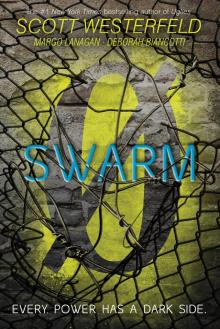 Swarm
Swarm Pretties
Pretties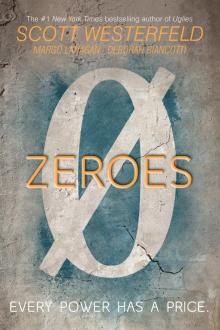 Zeroes
Zeroes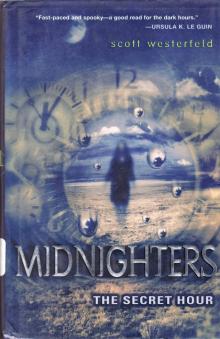 The Secret Hour
The Secret Hour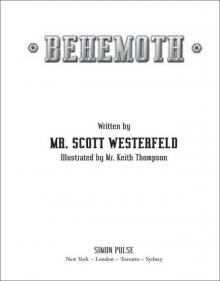 Behemoth
Behemoth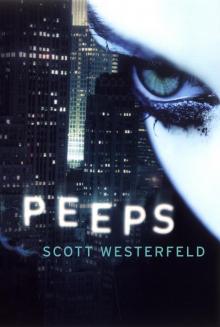 Peeps
Peeps Specials
Specials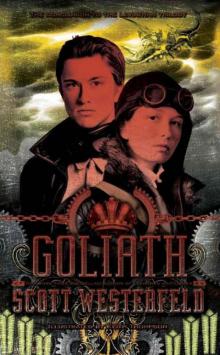 Goliath
Goliath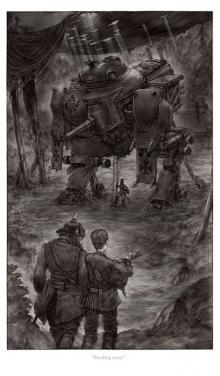 Leviathan
Leviathan Extras
Extras Shatter City
Shatter City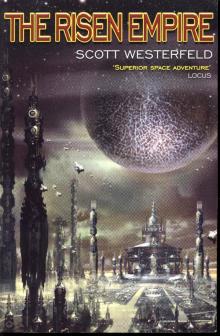 The Risen Empire
The Risen Empire Touching Darkness
Touching Darkness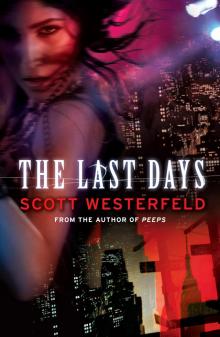 The Last Days
The Last Days So Yesterday
So Yesterday The Killing of Worlds
The Killing of Worlds Afterworlds
Afterworlds Mirror's Edge
Mirror's Edge Evolution's Darling
Evolution's Darling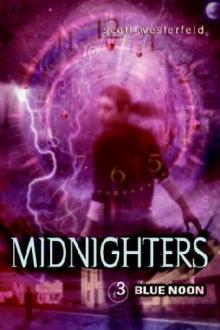 Blue Noon m-3
Blue Noon m-3 Touching Darkness m-2
Touching Darkness m-2 Impostors
Impostors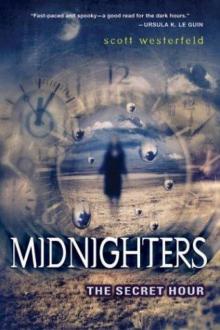 The Secret Hour m-1
The Secret Hour m-1 Leviathan 01 - Leviathan
Leviathan 01 - Leviathan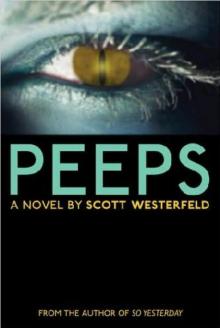 Peeps p-1
Peeps p-1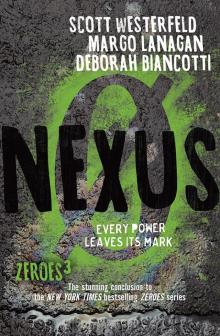 Nexus
Nexus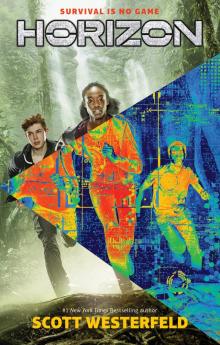 Horizon
Horizon Bogus to Bubbly
Bogus to Bubbly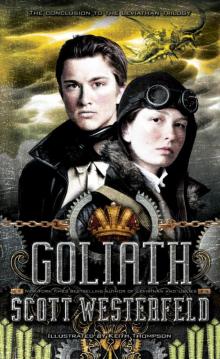 Goliath l-3
Goliath l-3 The Last Days p-2
The Last Days p-2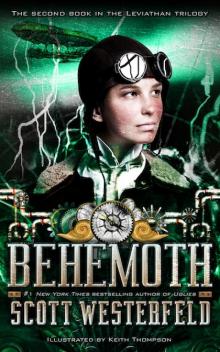 Behemoth l-2
Behemoth l-2 Stupid Perfect World
Stupid Perfect World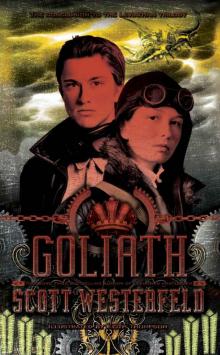 Goliath (Leviathan Trilogy)
Goliath (Leviathan Trilogy)